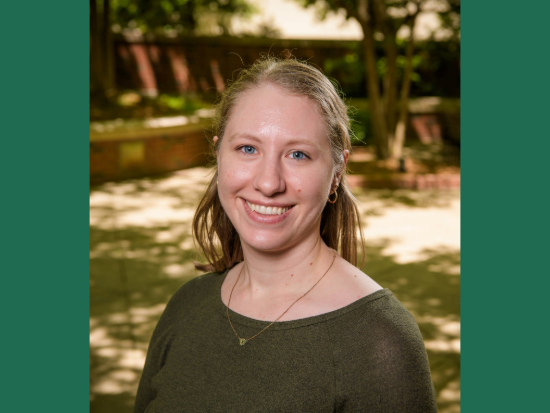 Jessica Lane, a Ph.D. candidate in UAB’s Graduate Biomedical Sciences (GBS) program, was recently awarded a prestigious two-year, $85,000 F31 grant from the NIH for her research focused on Streptococcus pneumoniae (Spn) disease. Lane is training in the lab of Carlos Orihuela, Ph.D., Triton Endowed Professor in Microbiology, in the UAB Department of Microbiology.
Jessica Lane, a Ph.D. candidate in UAB’s Graduate Biomedical Sciences (GBS) program, was recently awarded a prestigious two-year, $85,000 F31 grant from the NIH for her research focused on Streptococcus pneumoniae (Spn) disease. Lane is training in the lab of Carlos Orihuela, Ph.D., Triton Endowed Professor in Microbiology, in the UAB Department of Microbiology.
The NIH created the highly competitive F31 for predoctoral researchers in the biomedical, behavioral, or clinical sciences currently enrolled in a Ph.D. or equivalent research degree program. It funds mentored research experiences and serves to support trainees in their development into independent researchers.
Lane received her Bachelor of Science in Biology with a minor in biochemistry from Duquesne University in 2018. She went on to become a research technician in the lab of Carol Feghali-Bostwick, Ph.D., at the Medical University of South Carolina, where she worked for two years focused on using in vitro and ex vivo skin and lung models to prevent fibrosis as it presents as the disease scleroderma.
Lane joined Orihuela’s lab in 2021, when she entered the GBS program at UAB. Orihuela touted Lane’s independence in her research and her positive influence on her fellow lab mates.
“Jessica is an excellent student who strives to be her best,” Orihuela said. “She is thoughtful, organized, and methodological in her approach to science. I am lucky to have her in my group.”
Lane elaborates on her F31 award and the research it will support.
Give us an overview of your research, specifically as it pertains to the F31 grant.
Lane: My research in the Orihuela lab is primarily focused on the first stage of Streptococcus pneumoniae (Spn) disease: colonization of the upper respiratory tract (i.e. the nasal septa). I have developed a novel mouse model of Spn colonization that has recapitulated what we observe in the human population, which becomes colonized multiple times throughout their lifetimes with Spn. We hope to understand how humoral immunity develops after repeated colonization events and how biofilms play a role in enhancing or influencing that immunity over time. This research could someday inform future vaccine formulations against Spn and protect against pneumococcal pneumonia and invasive pneumococcal disease.
How will this grant propel your research goals going forward?
Lane: This award will allow me to continue my current research with my own support (as principal investigator of the grant) and opportunities to advance my technical and critical thinking skills. I will engage in collaborations within and outside of UAB to strengthen my science. My goals are to publish my work and advance the field in the hopes that my research will positively impact the broader populace.
Anything else you’d like to add?
Lane: I would like to thank my mentor for all his support and encouragement during this long grant application process and for continuing to champion my research now and in the future.